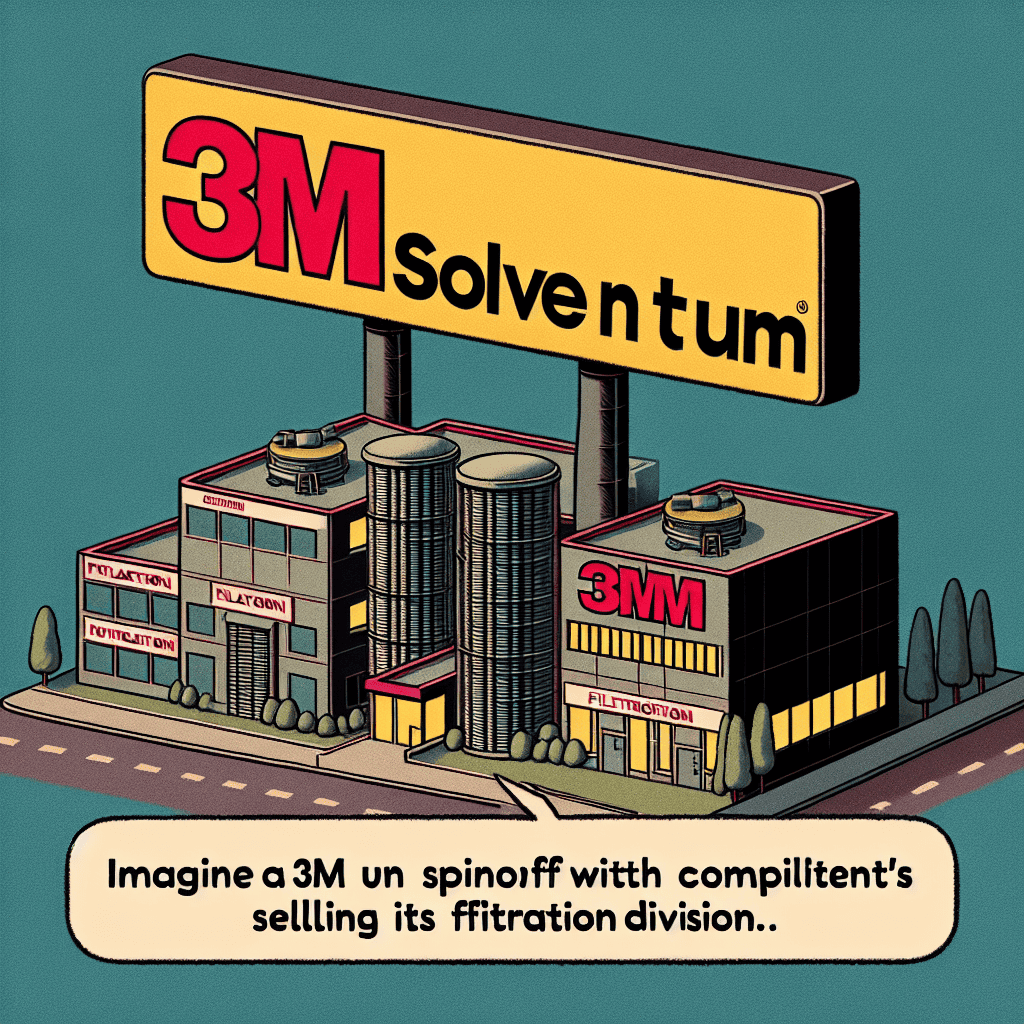“Solventum: Pioneering Purity, Exploring New Horizons.”
Introduction
Solventum, a recent spinoff from the industrial giant 3M, is making strategic moves in the market by considering the sale of its filtration division. This decision marks a significant step in Solventum’s efforts to streamline its operations and focus on core business areas that align with its long-term growth strategy. The filtration division, known for its innovative solutions and substantial market presence, has been a key component of 3M’s diverse portfolio. However, as Solventum seeks to carve out its own identity and optimize its asset base, the potential sale of this division could attract interest from various industry players looking to enhance their capabilities in the filtration sector. This move underscores Solventum’s commitment to reshaping its business model and maximizing shareholder value in a competitive industrial landscape.
Impact Of Solventum’s 3M Spinoff On The Market
The recent announcement of Solventum, a spinoff from the industrial giant 3M, considering the sale of its filtration division has sent ripples through the market, prompting analysts and investors alike to assess the potential impacts on both the company and the broader industry. As Solventum emerges as an independent entity, the strategic decision to possibly divest its filtration division marks a significant pivot in its business strategy, reflecting a broader trend of companies streamlining operations to focus on core competencies. This move is not only indicative of Solventum’s efforts to redefine its market position but also highlights the evolving dynamics within the industrial sector.
The filtration division, known for its innovative solutions and substantial market share, has long been a cornerstone of 3M’s diversified portfolio. However, as Solventum seeks to carve out its niche, the potential sale of this division could unlock capital and resources, allowing the company to invest in areas with higher growth potential. This strategic realignment is expected to enhance Solventum’s agility and competitiveness, enabling it to respond more effectively to market demands and technological advancements. Moreover, by shedding non-core assets, Solventum can streamline its operations, reduce complexity, and focus on sectors where it can leverage its expertise to drive innovation and growth.
From a market perspective, the potential sale of Solventum’s filtration division could create opportunities for other players in the industry. Competitors may view this as a chance to acquire valuable assets, expand their product offerings, and strengthen their market position. Additionally, new entrants could emerge, attracted by the prospect of acquiring established technologies and customer bases. This could lead to increased competition, driving further innovation and potentially benefiting consumers through improved products and services.
Furthermore, the divestiture could have implications for the supply chain and partnerships within the industry. Suppliers and partners of Solventum’s filtration division may need to reassess their strategies and relationships, potentially leading to shifts in alliances and collaborations. This realignment could foster new synergies and efficiencies, ultimately contributing to the overall dynamism of the market.
Investors, on the other hand, are closely monitoring Solventum’s strategic moves, as the sale of the filtration division could significantly impact the company’s financial performance and valuation. While the divestiture may initially result in a reduction in revenue, the potential for reinvestment in high-growth areas could enhance long-term profitability and shareholder value. Consequently, investor sentiment will likely hinge on Solventum’s ability to effectively execute its strategic vision and capitalize on emerging opportunities.
In conclusion, Solventum’s consideration of selling its filtration division underscores a pivotal moment in the company’s evolution as an independent entity. This strategic decision reflects broader industry trends towards specialization and agility, with potential implications for market dynamics, competition, and investment. As Solventum navigates this transition, its ability to adapt and innovate will be crucial in shaping its future trajectory and sustaining its competitive edge. The market will undoubtedly be watching closely, as the outcomes of this move could set a precedent for other companies contemplating similar strategic realignments in an ever-changing industrial landscape.
Strategic Reasons Behind Solventum’s Consideration To Sell Its Filtration Division
Solventum, a recent spinoff from the industrial giant 3M, is reportedly considering the sale of its filtration division, a move that has sparked considerable interest and speculation within the industry. This potential divestiture is not merely a financial maneuver but rather a strategic decision that aligns with Solventum’s broader objectives. Understanding the rationale behind this consideration requires an examination of the company’s current position, its long-term goals, and the dynamics of the filtration market.
Firstly, it is essential to recognize that Solventum, as a newly independent entity, is in the process of defining its identity and strategic focus. Spinoffs often seek to streamline operations and concentrate on core competencies to enhance shareholder value. For Solventum, this means identifying which segments of its business align most closely with its vision for growth and innovation. The filtration division, while profitable, may not fit into Solventum’s strategic framework, prompting the company to explore divestiture as a viable option.
Moreover, the filtration market is characterized by intense competition and rapid technological advancements. Companies operating in this space must continuously innovate to maintain a competitive edge. Solventum may have assessed that the resources required to sustain and grow its filtration division could be better allocated elsewhere, particularly in areas where the company sees greater potential for differentiation and leadership. By divesting the filtration division, Solventum could redirect capital and managerial focus towards segments that promise higher returns and align more closely with its strategic priorities.
In addition to internal strategic considerations, external market conditions also play a crucial role in Solventum’s decision-making process. The filtration industry is experiencing consolidation, with larger players acquiring smaller firms to expand their market share and technological capabilities. This trend presents an opportune moment for Solventum to capitalize on the high demand for filtration assets. By selling its division, Solventum could potentially secure a favorable valuation, providing a financial boost that could be reinvested into more strategic areas of the business.
Furthermore, the decision to consider selling the filtration division may also be influenced by Solventum’s desire to enhance its operational efficiency. Managing a diverse portfolio of businesses can lead to complexities and inefficiencies that detract from overall performance. By narrowing its focus, Solventum can streamline operations, reduce costs, and improve its agility in responding to market changes. This strategic realignment would enable the company to operate more effectively and position itself for sustainable growth in the long term.
Finally, it is important to consider the potential impact on stakeholders. For employees, customers, and partners associated with the filtration division, a sale could bring about uncertainty. However, Solventum is likely to prioritize a transition that minimizes disruption and ensures continuity of service. For investors, the divestiture could be seen as a positive step towards a more focused and potentially more profitable company.
In conclusion, Solventum’s consideration to sell its filtration division is driven by a combination of strategic, financial, and market factors. By divesting this segment, Solventum aims to sharpen its strategic focus, optimize resource allocation, and enhance operational efficiency. As the company navigates this potential transition, it remains committed to creating value for its stakeholders and positioning itself for future success in its chosen areas of focus.
Potential Buyers For Solventum’s Filtration Division
Solventum, a recent spinoff from the industrial giant 3M, has been making waves in the business world with its strategic decisions aimed at refining its focus and enhancing shareholder value. One of the most significant moves under consideration is the potential sale of its filtration division, a segment that has long been a cornerstone of its operations. This decision comes as Solventum seeks to streamline its portfolio and concentrate on its core competencies, thereby positioning itself more favorably in the competitive industrial landscape.
The filtration division, known for its innovative solutions and robust market presence, has attracted considerable interest from a variety of potential buyers. These include both strategic and financial investors, each with distinct motivations and potential synergies. Among the strategic buyers, large multinational corporations in the industrial and environmental sectors are particularly noteworthy. These companies are keen on expanding their product offerings and enhancing their technological capabilities, and acquiring Solventum’s filtration division could provide them with a significant competitive edge. The division’s advanced filtration technologies, which are crucial in industries ranging from healthcare to manufacturing, align well with the strategic goals of these potential acquirers.
In addition to strategic buyers, private equity firms are also eyeing the filtration division as a lucrative investment opportunity. These financial investors are attracted by the division’s strong cash flow and growth potential, viewing it as a valuable asset that can be optimized and potentially resold at a profit in the future. The interest from private equity firms underscores the division’s financial health and the potential for operational improvements that could further enhance its value.
Moreover, the global trend towards sustainability and environmental responsibility has heightened the appeal of filtration technologies. As industries worldwide strive to meet stricter environmental regulations and reduce their ecological footprint, the demand for advanced filtration solutions is expected to rise. This trend not only increases the attractiveness of Solventum’s filtration division but also broadens the pool of potential buyers to include companies focused on sustainability and green technologies.
While the interest from various parties is promising, Solventum faces the complex task of evaluating these potential buyers to ensure that the sale aligns with its long-term strategic objectives. The company must consider not only the financial aspects of the transaction but also the potential impact on its brand reputation and employee welfare. Furthermore, Solventum is likely to weigh the prospective buyer’s ability to maintain and grow the division’s market position, ensuring that the legacy of innovation and quality associated with its filtration products continues.
In conclusion, the potential sale of Solventum’s filtration division represents a pivotal moment for the company as it seeks to redefine its strategic focus. The interest from both strategic and financial buyers highlights the division’s value and the opportunities it presents in a rapidly evolving market. As Solventum navigates this complex process, the outcome will undoubtedly shape its future trajectory and influence its standing in the industrial sector. The decision will require careful consideration of various factors, including financial returns, strategic alignment, and the broader implications for the company’s stakeholders.
Financial Implications Of The 3M Spinoff For Solventum

The recent announcement of Solventum, a spinoff from the industrial giant 3M, considering the sale of its filtration division has sparked significant interest and speculation within the financial community. This potential divestiture is poised to have substantial financial implications for Solventum, as it navigates its newfound independence from 3M. Understanding these implications requires a closer examination of the strategic motivations behind the sale, the potential financial outcomes, and the broader market context in which Solventum operates.
To begin with, the decision to consider selling the filtration division appears to be a strategic move aimed at streamlining Solventum’s operations and focusing on its core competencies. By divesting a non-core asset, Solventum can potentially unlock value and redirect resources towards areas that align more closely with its long-term strategic goals. This approach is not uncommon among newly independent companies seeking to establish a clear identity and competitive advantage in the marketplace. Moreover, the filtration division, while profitable, may not fit seamlessly into Solventum’s vision for its future, prompting the company to explore opportunities for divestiture.
Financially, the sale of the filtration division could provide Solventum with a significant influx of capital. This capital could be utilized to reduce debt, invest in research and development, or pursue strategic acquisitions that bolster its market position. The potential financial windfall from the sale would also enhance Solventum’s balance sheet, providing greater financial flexibility and stability as it charts its course as an independent entity. Furthermore, the divestiture could lead to improved financial metrics, such as return on investment and profit margins, by eliminating a division that may not be delivering optimal returns relative to other segments of the business.
In addition to the internal financial benefits, the sale of the filtration division could have broader market implications. For potential buyers, acquiring this division represents an opportunity to gain access to established technologies and customer relationships, thereby enhancing their own market offerings. This could lead to increased competition within the filtration industry, as new players seek to leverage the acquired assets to capture market share. Consequently, Solventum’s decision to sell could reshape the competitive landscape, influencing pricing strategies and innovation within the sector.
However, it is important to consider the potential risks associated with this divestiture. The filtration division may have synergies with other parts of Solventum’s business that could be lost in the sale, potentially impacting operational efficiency. Additionally, the divestiture process itself can be complex and time-consuming, requiring careful management to ensure a smooth transition and to maximize the financial benefits of the sale. Solventum must also be mindful of how this move is perceived by investors and stakeholders, as it could influence market confidence and the company’s stock performance.
In conclusion, Solventum’s contemplation of selling its filtration division is a strategic decision with far-reaching financial implications. By potentially divesting this asset, Solventum aims to refine its focus and strengthen its financial position as an independent company. While the sale could provide significant capital and reshape the competitive landscape, it also carries inherent risks that must be carefully managed. As Solventum moves forward, the financial community will be closely monitoring the outcomes of this decision and its impact on the company’s future trajectory.
How The Filtration Division Sale Could Reshape Solventum’s Business Model
Solventum, a recent spinoff from the industrial giant 3M, is reportedly considering the sale of its filtration division, a move that could significantly reshape its business model. This potential divestiture comes at a time when Solventum is seeking to establish its identity and streamline its operations following its separation from 3M. The filtration division, known for its advanced technology and significant market share, has been a cornerstone of Solventum’s portfolio. However, the decision to sell this division could be driven by a strategic realignment aimed at focusing on core competencies and enhancing shareholder value.
The filtration division has long been a leader in providing innovative solutions across various industries, including healthcare, automotive, and industrial applications. Its products are renowned for their efficiency and reliability, making it a valuable asset within Solventum’s portfolio. Nevertheless, the potential sale of this division suggests that Solventum may be looking to concentrate its efforts on areas where it can achieve greater growth and profitability. By divesting from the filtration business, Solventum could reallocate resources to other segments that align more closely with its strategic vision.
Moreover, the sale of the filtration division could provide Solventum with a substantial influx of capital. This financial boost could be instrumental in funding research and development initiatives, expanding into new markets, or acquiring complementary businesses that bolster its core offerings. In an increasingly competitive landscape, having the financial flexibility to invest in innovation and growth opportunities is crucial for maintaining a competitive edge. Thus, the divestiture could serve as a catalyst for Solventum to enhance its market position and drive long-term success.
In addition to financial considerations, the potential sale of the filtration division may also reflect a shift in Solventum’s strategic priorities. As a newly independent entity, Solventum is likely evaluating its strengths and weaknesses to determine the most effective path forward. By shedding non-core assets, the company can sharpen its focus on areas where it possesses a distinct competitive advantage. This strategic realignment could lead to a more agile and responsive organization, better equipped to navigate the challenges and opportunities of the modern business environment.
Furthermore, the divestiture could have implications for Solventum’s workforce and organizational structure. The filtration division employs a significant number of skilled professionals whose expertise has been integral to its success. A sale could result in workforce realignments or transitions, necessitating careful management to ensure a smooth transition for employees and minimal disruption to operations. Solventum’s leadership will need to communicate transparently with stakeholders to maintain morale and retain key talent during this period of change.
In conclusion, the potential sale of Solventum’s filtration division represents a pivotal moment in the company’s evolution. While divesting from such a valuable asset may seem counterintuitive, it aligns with a broader strategy of focusing on core strengths and pursuing growth opportunities. The financial and strategic benefits of this move could position Solventum for sustained success in the years to come. As the company navigates this transition, it will be essential for Solventum to remain agile and responsive to market dynamics, ensuring that it continues to deliver value to its shareholders and customers alike.
Industry Reactions To Solventum’s Strategic Moves
Solventum, the recent spinoff from 3M, has been making waves in the industry with its strategic maneuvers, particularly its consideration of selling its filtration division. This potential divestiture has sparked a range of reactions from industry analysts, competitors, and stakeholders, each offering a unique perspective on the implications of such a move. As Solventum navigates its post-spinoff identity, the decision to possibly part with its filtration division is seen as a significant step in refining its business focus and optimizing its portfolio.
Industry analysts have been quick to weigh in on Solventum’s strategic considerations. Many view the potential sale as a logical step in the company’s efforts to streamline operations and concentrate on core competencies. By shedding non-core assets, Solventum could potentially unlock value and redirect resources towards areas with higher growth potential. This aligns with a broader trend in the industry where companies are increasingly focusing on specialization to enhance competitiveness and drive innovation. Analysts suggest that the filtration division, while profitable, may not align with Solventum’s long-term strategic goals, thus making it a candidate for divestiture.
Competitors, on the other hand, are closely monitoring Solventum’s moves, recognizing both opportunities and challenges that may arise from the sale. For some, the divestiture could mean reduced competition in the filtration market, potentially allowing them to capture a larger market share. However, it also opens the door for new entrants or existing players to acquire the division, which could lead to increased competition if the buyer is a well-capitalized entity with plans to expand aggressively. This dual-edged sword has competitors carefully considering their own strategic responses, whether it be through ramping up their own capabilities or exploring similar divestitures to sharpen their focus.
Stakeholders, including investors and employees, are also keenly interested in the outcome of Solventum’s strategic deliberations. Investors are particularly focused on the financial implications of a potential sale. A successful divestiture could result in a significant influx of capital, which could be used to reduce debt, fund new initiatives, or return value to shareholders through dividends or share buybacks. This prospect is generally viewed positively by the investment community, as it could enhance Solventum’s financial flexibility and overall market position. Employees, meanwhile, may have mixed feelings, as divestitures often lead to uncertainty regarding job security and organizational changes. However, clear communication from Solventum’s leadership about the rationale and benefits of the move could help mitigate concerns and foster a sense of shared purpose.
In conclusion, Solventum’s consideration of selling its filtration division is a strategic move that has elicited varied reactions across the industry. While analysts see it as a step towards greater focus and efficiency, competitors are evaluating the potential market dynamics that could result. Stakeholders, including investors and employees, are assessing the financial and organizational impacts of such a decision. As Solventum continues to chart its course as an independent entity, the industry will be watching closely to see how this potential divestiture unfolds and what it signifies for the company’s future trajectory. Through careful planning and execution, Solventum has the opportunity to redefine its position in the market and set a precedent for strategic agility in the ever-evolving industrial landscape.
Future Prospects For Solventum Post-3M Spinoff And Filtration Division Sale
Solventum, a recent spinoff from the industrial giant 3M, is currently evaluating the potential sale of its filtration division, a move that could significantly reshape its future trajectory. As a newly independent entity, Solventum is navigating the complexities of establishing its identity and strategic direction in the competitive industrial sector. The decision to consider divesting its filtration division is indicative of a broader strategy to streamline operations and focus on core competencies that align with its long-term vision.
The filtration division, known for its innovative solutions in air and liquid filtration, has been a significant contributor to Solventum’s revenue. However, the decision to potentially sell this division suggests a strategic pivot towards areas where Solventum can leverage its strengths more effectively. By divesting this segment, Solventum aims to reallocate resources and capital towards sectors that promise higher growth and profitability. This move is not uncommon among companies seeking to refine their business models post-spinoff, as it allows them to concentrate on areas with the most strategic importance.
Moreover, the sale of the filtration division could provide Solventum with a substantial influx of capital, which could be reinvested into research and development, enhancing its technological capabilities and product offerings. This financial flexibility is crucial for Solventum as it seeks to establish itself as a leader in its chosen markets. Additionally, the divestiture could lead to strategic partnerships or collaborations with other industry players, further strengthening Solventum’s market position.
In the context of the broader industrial landscape, Solventum’s decision to consider selling its filtration division reflects a growing trend among companies to focus on specialization and innovation. As industries become increasingly competitive and technology-driven, businesses are compelled to adapt by honing their expertise in specific areas. For Solventum, this means identifying and capitalizing on opportunities that align with its core strengths and market demands.
Furthermore, the potential sale of the filtration division could have implications for Solventum’s workforce and operational structure. While divestitures often lead to restructuring, they also present opportunities for employees to engage in new projects and initiatives that align with the company’s strategic goals. Solventum’s leadership will need to manage this transition carefully, ensuring that employees are supported and that the company’s culture and values are preserved.
Looking ahead, Solventum’s future prospects post-spinoff and potential filtration division sale appear promising, provided the company executes its strategy effectively. By focusing on its core competencies and leveraging the financial and strategic benefits of the divestiture, Solventum can position itself as a dynamic and agile player in the industrial sector. The company’s ability to innovate and adapt to changing market conditions will be critical to its success.
In conclusion, Solventum’s consideration of selling its filtration division marks a pivotal moment in its journey as an independent entity. This strategic decision underscores the company’s commitment to refining its focus and enhancing its competitive edge. As Solventum navigates this transition, its emphasis on specialization, innovation, and strategic growth will be key drivers of its future success. The outcome of this potential sale will undoubtedly shape Solventum’s path forward, influencing its market position and long-term viability in the ever-evolving industrial landscape.
Q&A
1. **What is Solventum?**
Solventum is a spinoff company from 3M, focusing on specific business segments that 3M has decided to separate from its core operations.
2. **Why is 3M spinning off Solventum?**
3M is spinning off Solventum to streamline its operations and focus on its core businesses, allowing Solventum to operate independently and potentially unlock more value.
3. **What business areas does Solventum cover?**
Solventum covers business areas that 3M has identified as non-core to its primary operations, which may include segments like filtration, specialty chemicals, or other industrial products.
4. **Is Solventum considering selling its filtration division?**
Yes, Solventum is considering selling its filtration division as part of its strategic review to focus on its core competencies and optimize its business portfolio.
5. **What is the potential impact of selling the filtration division?**
Selling the filtration division could provide Solventum with capital to invest in other areas, streamline its operations, and potentially improve its financial performance.
6. **Who might be interested in buying the filtration division?**
Potential buyers for the filtration division could include other industrial companies, private equity firms, or competitors looking to expand their market share in the filtration industry.
7. **What are the expected benefits for 3M from the Solventum spinoff?**
The expected benefits for 3M from the Solventum spinoff include a more focused business strategy, improved operational efficiency, and the ability to concentrate resources on its core areas of innovation and growth.
Conclusion
Solventum, a spinoff from 3M, is reportedly considering the sale of its filtration division. This strategic move could be aimed at streamlining operations and focusing on core business areas, potentially enhancing shareholder value. The sale of the filtration division might attract interest from companies looking to expand their market presence in the filtration industry. If executed successfully, this divestiture could provide Solventum with additional capital to invest in growth opportunities or reduce debt, thereby strengthening its financial position. However, the decision to sell a significant division also carries risks, such as the potential loss of revenue streams and market share. Overall, the consideration to sell the filtration division reflects Solventum’s strategic efforts to optimize its business portfolio and align with long-term corporate objectives.





